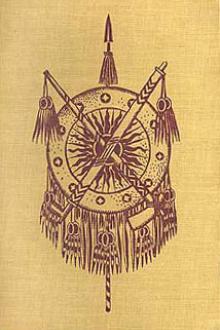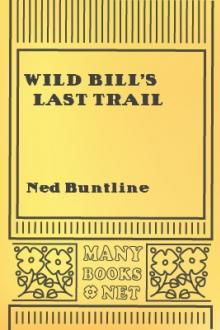The Hidden Children, Robert W. Chambers [e book reader free .txt] 📗

- Author: Robert W. Chambers
Book online «The Hidden Children, Robert W. Chambers [e book reader free .txt] 📗». Author Robert W. Chambers
"A careless paddle-stroke did it," I said in a low voice.
"No Indian is careless."
"What do you mean by that?"
"I mean, Loskiel, that the boulder was splashed purposely, or that there are white men in that canoe."
"Splashed purposely?" I said, bewildered.
"Perhaps. The Black-Snake had the river watch—until you changed our stations."
"You think it might have been a sign for him from possible confederates."
"Maybe. Maybe clumsy white men."
"What white men? No forest runners dare range these woods at such a time as this. Do you mean a scalping party of Butler's men?"
"Maybe."
We had been walking swiftly while we spoke together in low and guarded tones; now I nodded my comprehension, sheered off to the right, took the trail-lead, replacing the Stockbridge Mole, and signalled the nearest Oneida, Grey-Feather, to join Mayaro on the left flank. This made it necessary for me to call the Wyandotte into touch, which I did; and the other Oneida, the "Night-Hawk," or Tahoontowhee, closed in from the extreme outer flank.
The presence of that canoe worried me, nor could I find any explanation for it. None of our surveyors was out—no scouts had gone in that direction. Of course I knew that we were likely to run across scouts or scalping parties of the enemy almost anywhere between the outlet to Otsego Lake and Tioga Point, yet somehow had not expected to encounter them until we had at least reached the Ouleout.
Another thing; if this phantom canoe was now within an hour of us, and going with the current, it must at one time have been very, very close to us—in fact, just ahead and within sight of the Wyandotte, if, indeed, it had not come silently downstream from behind us and shot past us in plain view of the Black-Snake.
Was the Wyandotte a traitor? For only he could have seen this. And I own that I felt more comfortable having him on our right flank in the forest, and away from the river; and as I notched my trees I kept him in view, sideways, and pondered an the little that I knew of him, but came to no conclusion. For of all things in the world I know less of treachery and its wiles than of any other stratagem; and so utterly do I misunderstand it, and so profound is my horror of it, that I never can credit it to anybody until I see them hanged by the neck for it or shot in hollow square, a-sitting upon their coffins.
Presently I saw the Sagamore stop and make signs to me that the ford was in sight. Immediately I signalled the Wyandotte and the farther Oneida to close in; and a few moments later we were gathered in the forest shadow above the river, lying on our bellies and gazing far down stream at the distant line of ripples running blood-red under the sunset light.
Was there an ambush there, prepared for us? God knew. Yet, we must approach and examine that ford, and pass it, too, and resume our march on the right bank of the river to avoid the hemlock swamps and rocky hills ahead, which no wagons or artillery could hope to pass.
My first and naturally cautious thought was to creep nearer and then send the Wyandotte out under cover of our clustered rifles. But if he were truly in any collusion with an unseen enemy they would never fire on him, and so it would be useless to despatch him on such a mission.
"Wait for the moon," said the Sagamore very quietly.
His low, melodious voice startled me from my thoughts, and I looked around at him inquiringly.
"I will go," said the Wyandotte, smiling.
"One man will never draw fire from an ambush," said the Grey-Feather cunningly. "The wild drake swims first into the net; the flock follows."
"Why does my younger brother of the Oneida believe that we need fear any ambush at yonder ford?" asked the Wyandotte so frankly that again I felt that I could credit no ill of any man who spoke so fairly.
"Listen to the crows," returned the Oneida. "Their evening call to council is long and deliberate—Kaah! Kaah! Kaah—h! What are they saying now, Black-Snake, my elder brother?"
I glanced at the Mohican in startled silence, for we all were listening very intently to the distant crows.
"They have discovered an owl, perhaps," said the Wyandotte, smiling, "and are tormenting him."
"Or a Mountain Snake," said the Sagamore blandly.
Now, what the Sagamore said so innocently had two meanings. He might have meant that the cawing of the crows indicated that they were objecting to a rattlesnake sunning on some rock. Also he might have meant to say that their short, querulous cawing betrayed the presence of Seneca Indians in ambush.
"Or a Mountain Snake," repeated the Siwanois, with a perfectly blank face. "The red door of the West is still open."
"Or a bear," said the Grey-Feather, cunningly slurring the Canienga word and swallowing the last syllable so that it might possibly have meant "Mohawk."
The Wyandotte turned good-humouredly to the Mohican, not pretending to misunderstand this subtle double entendre and play upon words.
"You, Sagamore of the Loups," he said, carrying out the metaphor, "are closer to the four-footed people than are we Wyandottes."
"That is true," said the Grey-Feather. "My elder brother, the Black-Snake, wears the two-legged hawk."
Which, again, if it was meant that way, hinted that the Hawk was an alien clan, and neither recognized nor understood by the Oneida. Also, by addressing the Wyandotte as "elder" brother, the Oneida conveyed a broad hint of blood relationship between Huron and Seneca. Yet, there need have been nothing definitely offensive in that hint, because among all the nations a certain amalgamation always took place after an international conflict.
The Wyandotte did not lose his temper, nor even, apparently, perceive how slyly he was being baited by all except myself.
"What is the opinion of the Loup, O Sagamore?" he asked lightly.
"Does my brother the Black-Snake desire to know the Sagamore's opinion concerning the cawing of yonder crows?"
The Wyandotte inclined his ugly head.
"I think," said the Mohican deliberately, "that there may be a tree-cat in their vicinity."
A dead silence followed. The Wyandotte's countenance was still smiling, but I thought the smile had stiffened and become fixed, though not a tremour moved him. Yet, what the Mohican had said—always with two meanings, and one quite natural and innocent—meant, if taken in its sinister sense, that not only might there be Senecas lying in ambush at the ford, but also emissaries from the Red Priest Amochol himself. For the forest lynx, or tree-cat, was the emblem of these people; and every Indian present knew it.
Still, also, every man there had seen crows gather around and scold a lynx lying flattened out on some arching limb.
Whether now there was any particular suspicion of this Wyandotte among the other Indians; whether it was merely their unquenchable and native distrust of any Huron whatever; whether the subtle chaff were playful or partly serious, I could not determine from their manner or expression. All spoke pleasantly and quietly, and with open or expressionless countenances. And the Wyandotte still smiled, although what was going on under that urbane mask of his I had no notion whatsoever.
I turned cautiously, and looked behind us. We were gathered in a kind of natural and moss-grown rocky pulpit, some thirty feet above the stream, and with an open view down its course to the distant riffles. Beyond them the river swung southward, walling our view with its flanking palisade of living green.
"We camp here," I said quietly. "No fire, of course. Two sentinels—the Night Hawk and the Black-Snake. The guard will be relieved every two hours. Wake me at the first change of watch."
I laid my watch on a rock where all could see it, and, opening my sack, fished out a bit of dried beef and a handful of parched corn.
Mayaro shared with me on my motioned invitation; the others fell to in their respective and characteristic manners, the Oneidas eating like gentlemen and talking together in their low and musical voices; the Wyandotte gobbling and stuffing his cheeks like a chipmunk. The Stockbridge Mole, noiseless and mum as the occult and furry animal which gave to him his name, nibbled sparingly all alone by himself, and read in his Algonquin Testament between bites.
The last level sun rays stripped with crimson gold the outer edges of the woods; the stream ran purple and fire, and the ceaseless sighing of its waters sounded soft as foliage stirring on high pines.
I said to the Mole in a low voice:
"Brother in Christ, do you find consolation and peace in your Testament when the whole land lies writhing under the talons and bloody beak of war?"
The Stockbridge warrior looked up quietly:
"I read the promise of the Prince of Peace, brother, who came to the world not bearing a sword."
"He came to fulfill, not to destroy," I said.
"So it is written, brother."
"And yet you and I, His followers, go forth armed to slay."
"To prepare a place for Him—His humble instruments—lest His hands be soiled with the justice of God's wrath. What is it that we wade in blood, so that He pass with feet unsoiled?"
"My brother has spoken."
The burning eyes of the calm fanatic were fastened on me, then they serenely reverted to the printed page on his knees; and he continued reading and nibbling at his parched and salted corn. If ever a convert broke bread with the Lord, this red disciple now sat supping in His presence, under the immemorial eaves of His leafy temple.
The Grey-Feather, who had been listening, said quietly:
"We Iroquois alone, among all Indians, have always acknowledged one Spirit. We call Him the Master of Life; you Christians call Him God. And does it truly avail anything with Tharon, O my brother Loskiel, if I wear the Turtle, or if my brother the Mole paints out the Beaver on his breast with a Christian cross?"
"So that your religion be good and you live up to it, sign and symbol avail nothing with God or with Tharon," said I.
"Men wear what they love best," said the Mole, lightly touching his cross.
"But under cross and clan ensign," said I, "lies a man's secret heart. Does the Master of Life judge any man by the colour of his skin or the paint he wears, or the clothing? Christ's friends were often beggars. Did Tharon ever ask of any man what moccasins he wore?"
The Sagamore said gravely:
"Uncas went naked to the Holder of the Heavens."
It was a wonderful speech for a Sagamore and an Algonquin, for he used the Iroquois term to designate the Holder of Heaven. The perfect courtesy of a Christian gentleman could go no further. And I thought of our trivial and petty and warring sects, and was silent and ashamed.
The Wyandotte wiped his powerful jaw with a handful of dead leaves, and looked coldly around at the little circle of men who differed with one another so profoundly in their religious beliefs.
"Is this then the hour and the place to discuss such matters, and irritate the Unseen?"
All eyes were instantly turned on the pagan; the Oneidas seemed troubled; the Sagamore serious. Only the Christian Indian remained placid and indifferent, his Testament suspended in his hand. But he also was listening.
As for me, I knew as well as did the others what the pagan and burly Wyandotte meant.
To every Indian—even to many who had been supposedly converted—air, earth, and water still remained thronged with demons. The vast and sunless wilderness was peopled with goblins and fairies. No natural phenomenon occurred except by their agency. Where the sun went after it had set, where the moon hid, the stars, the four great winds, the eight thunders—all remained mysteries to these red children of the forest. And to these mysteries demons held the keys. For no star fell, showering the night with incandescence, no comet blazed aloft, its streaming hair sweeping from zenith to horizon, no eclipse devoured sun or moon, no sunrise painted the Long House golden, no sunset stained its lodge-poles crimson, no waters ran, no winds blew, no clouds piled up quivering with lightning, no thunder rumbled, except that it was done by demons.
Fur, feather, and silver-scale also had souls, and slyly took council together when alone; the great trees talked to one another in forest depths; moonlit rocks conversed in secret; and peak whispered to peak above the flowing currents of the mist.
It was useless to dispute such matters with them, while every phenomenon of nature remained to them a mystery. For they had brains and a matchless imagination, and they were obliged to solve these things for themselves as best they knew how, each people according to its personal characteristics.
So, among the Onondagas, Oneidas, and Mohawks, evil demons were few, and good





Comments (0)